|
|
|
Sort Order |
|
|
|
Items / Page
|
|
|
|
|
|
|
| Srl | Item |
| 1 |
ID:
126036
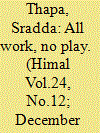

|
|
|
|
|
| Publication |
2011.
|
| Summary/Abstract |
On a random Wednesday in June this year, my 13-year-old cousin was not in school. This was not due to one of the many bandhs or another addition to one of the all-too-many public holidays celebrated in Nepal. Instead, every 10th grader in her school had passed the all-important School Leaving Certificate examinations - 'Half with distinction', she added. This is certainly quite an achievement - apparently, enough of one to give every student, 10th grader or not, the day off. Indeed, declaring a holiday for simplistic reasons has become a frequent occurrence in Nepal, to the extent that days 'off' sometimes feel more like the norm than days 'on'. Yet before we raise our eyebrows at the school administration for the example they are setting for schoolchildren, we need to consider a few additional issues.
|
|
|
|
|
|
|
|
|
|
|
|
|
|
|
|
| 2 |
ID:
126046
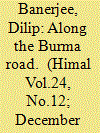

|
|
|
|
|
| Publication |
2011.
|
| Summary/Abstract |
Yunnan was one of the worst-hit areas during World War II, almost completely destroyed by Japanese bombing. By today the province has been rebuilt, however, and the old Burma Road - that icon of the war, used to transport support material for the Allies into China - has been upgraded into a six-lane highway. Once it crosses the Chinese border, however, this potentially lucrative land link between China and India falls into disrepair, despite years of plans to upgrade it. On the Indian side, the Ledo Road (or Stilwell Road, after an American general), links up to the Burma Road, and is indeed motorable. But it too falls into disrepair on the Burma side.
|
|
|
|
|
|
|
|
|
|
|
|
|
|
|
|
| 3 |
ID:
126047
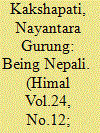

|
|
|
|
|
| Publication |
2011.
|
| Summary/Abstract |
Tharu. Chhetri. Danuwar. Gurung. Lohar. Newar. The Nepali people belong to 102 ethnicities, castes and other groups and speak 92 living languages. Amidst sweeping political changes, it has become very important to define oneself along ethnic lines, to show where loyalties lie.
|
|
|
|
|
|
|
|
|
|
|
|
|
|
|
|
| 4 |
ID:
126026
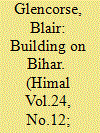

|
|
|
|
|
| Publication |
2011.
|
| Summary/Abstract |
Poor infrastructure, weak human capacity, politicised local bureaucracies, difficult caste relations, debilitating power shortages and deeply entrenched poverty - driving around Bihar recently, it was clear that the state has yet to transform into the orderly, prosperous society that recent press coverage has suggested. That said, there is no doubt that a nascent but carefully structured institutional reform process is allowing for the slow emergence of a 'naya' Bihar. Since 2005, the government of Nitish Kumar has consolidated rule of law, built critical infrastructure, begun to deliver services, increased revenues and expenditures, improved bureaucratic functionality, and generated an important sense of citizenship among many of the state's communities. The economy has grown at over 10 percent per year for the past six years, despite the separation of resource-rich Jharkhand in 2000, periodic floods and droughts, and the recent global financial crisis.
|
|
|
|
|
|
|
|
|
|
|
|
|
|
|
|
| 5 |
ID:
126027
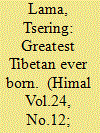

|
|
|
|
|
| Publication |
2011.
|
| Summary/Abstract |
Thupten arrived at the Kathmandu airport, grabbed his duffle bag from the conveyor belt and walked right past the security check. There was a huddle of people waiting to put their bags into the scanner, and at the sight of him they gripped their rusty carts and shouted at the security guards, 'Oye! Ke ho esto? Wake up, security!' But the skinny men didn't stand a chance at stopping Thupten. Instead, they just sat on their wooden stools, mouths agape as the strange longhaired man barrelled by with his duffel bag. Was he Chinese? Japanese? He didn't even look back! He just stomped by, right towards the sunny glass doors where a hundred greeters waited for loved ones, though Thupten knew none of them waited for him.
|
|
|
|
|
|
|
|
|
|
|
|
|
|
|
|
| 6 |
ID:
126040


|
|
|
|
|
| Publication |
2011.
|
| Summary/Abstract |
You are tent-bound in the mountains, in a storm. Time to read a good book. Will it be British mountaineer George Mallory's choice: Shakespeare? Or Dostoevsky, the favourite of another mountain-loving Briton, Bill Tilman. Heavy stuff, both of them. For a lighter read, try W E Bowman's hilarious mountaineering satire, The Ascent of Rum Doodle. First published in 1956, Rum Doodle is now on The Guardian's list of '1000 Novels Everyone Must Read' and among Colorado-based publisher Chessler's '100 Best Mountaineering Books'. It has been called 'an epic', 'Homeric',' inspiring' and 'very, very funny'.
|
|
|
|
|
|
|
|
|
|
|
|
|
|
|
|
| 7 |
ID:
126044
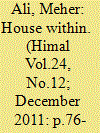

|
|
|
|
|
| Publication |
2011.
|
| Summary/Abstract |
Our car comes to a halt a few metres from a main crossing in Turiaganj, also known as Victoriaganj. At first we cannot locate the house, so we climb up a few flights of stairs to a row of shops. There, a shopkeeper points straight ahead and, opposite us, behind shops packed together like a deck of cards, a haveli rises. From afar, it almost seems like a child's sandcastle, with none of the frills commonly associated with havelis of North India. Instead, it seems to have been inspired by gothic architecture, two towers on either side of the conical façade rising up. Crescent-shaped swirls like half-drawn flowers are engraved on their arches, and perpendicular pillars are topped with football-shaped concrete blocks. A plaque above the arch of the left tower reads 'Adabistan' - the abode of literature. As we enter, the haveli greets us with LIVE AND LET LIVE carved along the roof's boundary wall.
|
|
|
|
|
|
|
|
|
|
|
|
|
|
|
|
| 8 |
ID:
126031


|
|
|
|
|
| Publication |
2011.
|
| Summary/Abstract |
They gave me a mango at breakfast in Chiang Mai, in northern Thailand, in the boutique hotel where I was staying. The mango was beautifully presented in Thai style: two halves on the plate with the seed removed. The halves were cut into even bite-sized slices. The mango was not too ripe but full of flavour. Each firm portion tasted identical to the last one, and I had to restrain myself from eating too quickly. The mango was mouth- wateringly delicious.
|
|
|
|
|
|
|
|
|
|
|
|
|
|
|
|
| 9 |
ID:
126024
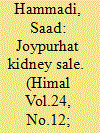

|
|
|
|
|
| Publication |
2011.
|
| Summary/Abstract |
Twenty-six-year-old Mizanur Rahman was desperately looking for a way to settle debts he had incurred while buying a small piece of land in Bagoil, a village in Joypurhat district in the north of Bangladesh. It had been three years, and the loan sharks who had lent him 10,000 taka (USD 130) three years ago were now asking for more than three times as much, some USD 418. Mizanur is a farmer with a two-year-old son and a wife to take care of, and he wanted to get rid of his debts so that his family would not have to deal with them. He heard that his neighbour had earned some quick cash by donating one of his kidneys - a man named Golam was brokering kidney transplant in his village. 'You will not even realise that you had a surgery,' he had told Mizanur. So, on 3 August, Mizanur went to a Dhaka hospital and gave away one of his kidneys; in return, he was paid USD 1830.
|
|
|
|
|
|
|
|
|
|
|
|
|
|
|
|
| 10 |
ID:
126028
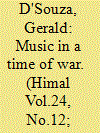

|
|
|
|
|
| Publication |
2011.
|
| Summary/Abstract |
My grandfather, Alex De Souza, from the Goan village of Sangolda, was a typical early emigrant to Burma. At his parish school, he had studied Portuguese, Konkani, Christian doctrine and sacred music. He went to Rangoon in the first decade of the 20th century. This was an era of silent movies, when live musicians with excellent sight-reading skills were needed to provide the background music to the films being screened, from printed scores provided by the producers. Musicians were also needed for the orchestras that played in hotels and clubs, and in British military bands. Talented Goan musicians found ready opportunities in the large cities of British India, of which Burma was then a part. In Rangoon, living in a 'chummery' (bachelor lodgings) to begin with, Alex joined a string quartet of violins, viola and cello, playing light chamber music such as Strauss waltzes, Hungarian dances, Gypsy airs, Italian ballads (cancions), Iberian tangos and the like for formal luncheons and dinners at the Strand Hotel and Pegu Club.
|
|
|
|
|
|
|
|
|
|
|
|
|
|
|
|
| 11 |
ID:
126014
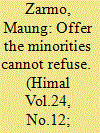

|
|
|
|
|
| Publication |
2011.
|
| Summary/Abstract |
In his Manifesto of the Communist Party (1848), Karl Marx wrote: 'The history of all hitherto existing society is the history of class struggles.' Such an assessment is only half-right when it comes to Burma's internal conflicts, of which ethnicity is of equal importance to class. Whether ethnicity is largely a matter of 'political choice', as many academics suggest today, has little relevance in the lives of these ethnic peoples. The Karen, Kachin, Mon, Shan, Karenni and others have chosen to hold on to their AK-47s or M16s in order to fight on. The unappealing alternative is surrender and subjugation at the feet of their uncompromising enemy in Rangoon and, since 2005, Naypyidaw.
|
|
|
|
|
|
|
|
|
|
|
|
|
|
|
|
| 12 |
ID:
126016


|
|
|
|
|
| Publication |
2011.
|
| Summary/Abstract |
18 November was a big day for Burma watchers, at least for those in favour of detente with the regime. On that day, President Barack Obama, apparently deciding to give the Burmese government the benefit of the doubt with regard to its 'reforms' process, called democracy leader Aung San Suu Kyi from Air Force One as he was on his way to Bali, Indonesia, to attend the annual ASEAN Summit. They talked for 20 minutes, with Suu Kyi reportedly inquiring about the president's entire family, even his dog, Bo. Soon after, President Obama announced that he would send his secretary of state, Hilary Clinton to Burma on 1 December, to test whether the validity of the new reforms put in place by the government. It is yet unclear whether Clinton will be able to see the political prisoners still in jail, especially the 2007 'Saffron Revolution' leader U Gambira and Min Ko Naing, the political activist made famous during the 1988 uprisings.
|
|
|
|
|
|
|
|
|
|
|
|
|
|
|
|
| 13 |
ID:
126009
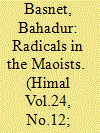

|
|
|
|
|
| Publication |
2011.
|
| Summary/Abstract |
A political agreement signed on 1 November was finally supposed to allow former Maoist combatants in Nepal to move ahead with their lives. Instead, the response has been mostly anger and accusations of duplicity.
|
|
|
|
|
|
|
|
|
|
|
|
|
|
|
|
| 14 |
ID:
126008


|
|
|
|
|
| Publication |
2013.
|
| Summary/Abstract |
The announcement of the decision by the fifth king of Bhutan, Jigme Khesar Namgyel Wangchuk, to marry did not come as a great surprise to the Bhutanese people, although initially the choice of his bride did. He was marrying a commoner, and outside of a small circle of people most Bhutanese did not have a clue who she was. But from the moment Jetsun Pema was introduced to the Bhutanese public - through a limited set of photographs released by the royal photographers and some well-chosen low-key public appearances - few considered her anything but an intelligent, demure, well-educated and truly beautiful young woman. Once Pema was slowly and carefully exposed to the public, the people were hooked.
|
|
|
|
|
|
|
|
|
|
|
|
|
|
|
|
| 15 |
ID:
126019
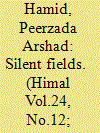

|
|
|
|
|
| Publication |
2011.
|
| Summary/Abstract |
Surankot is a small dusty frontier town of Poonch district in Jammu & Kashmir. A row of decrepit concrete constructions - the town's marketplace - stand face to face on the both sides of a narrow, potholed road. At the end of this line of shops, a bend in the road leads to the police station and an Indian Army cantonment. A stone's throw further is a graveyard containing unmarked graves, with bodies unknown to the resident
|
|
|
|
|
|
|
|
|
|
|
|
|
|
|
|
| 16 |
ID:
126011


|
|
|
|
|
| Publication |
2011.
|
| Summary/Abstract |
We are looking for the opening to the road to democracy,' said Aung San Suu Kyi during a frenetic press conference held in mid-November at the office of her party, the National League for Democracy (NLD), to mark the first anniversary of her release from house arrest. That year has been quite dramatic itself: Suu Kyi's image is now on newspapers and magazines near and far, the BBC is no longer forced to enter the country illegally, and Burma is set to chair the ASEAN regional bloc in 2014. Burma's generals had famously claimed that they were aiming to institute a system of 'discipline flourishing democracy' in the country - a vague phrase that only ever seemed to suit the needs of the military. Today, amidst new optimism, few have any more concrete answers on what might be taking place.
|
|
|
|
|
|
|
|
|
|
|
|
|
|
|
|
| 17 |
ID:
126010
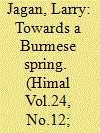

|
|
|
|
|
| Publication |
2011.
|
| Summary/Abstract |
How much difference a year can make! The walls of closed society seem to be falling in Burma. But will the army remain silent?
Change is in the air in Burma, according to many in Rangoon. Though how long until the winds shift remains an open question. 'There's definitely a Burmese Spring here,' said a senior member of Aung San Suu Kyi's National League for Democracy (NLD), on condition of anonymity. 'But whether it's only an illusion, a false dawn as we have had many times before, only time will tell.' Nonetheless, many in the pro-democracy movement within Burma are optimistic, believing that the new president, Thein Sein, is serious about economic and political change. Critically, this is a process that seems to include Suu Kyi herself, though for the moment it is very unclear what role she may play.
|
|
|
|
|
|
|
|
|
|
|
|
|
|
|
|
| 18 |
ID:
126030


|
|
|
|
|
| Publication |
2011.
|
| Summary/Abstract |
The first autobiography I ever read was providentially, or prophetically, or perhaps both, Seven Years Solitary, by a Hungarian woman who had been in the wrong faction during the Communist Party purges of the early 1950s. At 13 years old, I was fascinated by the determination and ingenuity with which one woman alone was able to keep her mind sharp and her spirit unbroken through the years when her only human contact was with men whose everyday preoccupation was to try to break her. It is one of the most basic needs that those who decide to go into, and to persevere in, the business of dissent have to be prepared to live without. In fact living without is a huge part of the existence of dissidents.
|
|
|
|
|
|
|
|
|
|
|
|
|
|
|
|
|
|
|
|
|